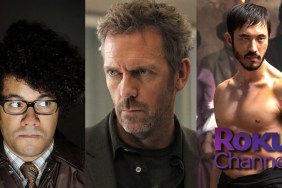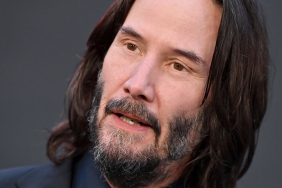James Mottern’s filmmaking debut Trucker is a pretty amazing achievement, not only for the unforgettable performance he got out of his star Michelle Monaghan and the rest of the cast, but also for what he was able to do for relatively little money.
ComingSoon.net got on the phone with Mottern to talk about his debut film, and it was pretty hard for both of us not to spend the entire interview gushing about his leading lady.
ComingSoon.net: I know you spent a long time trying to get this movie made, so what was the germ of an idea that got the whole thing rolling? Did you meet someone who inspired making a movie about a female truck driver?
James Mottern: Yeah, it’s funny because I grew up in Virginia and there was a lot of trucking around there, and then I moved out to the California desert for a while. I don’t know if you’ve been out in that area of Riverside, but it’s kind of like this weird place where there’s so much tracking and transportation. You feel like you’re in the middle of nowhere but at the same time, it’s kind of vibrant, it’s pretty neat. I’d seen lots of truckers and there was one time I was in this truck stop and I saw this woman come in who was all in denim with bleached-out hair, and when she turned, I could see her eyes. When people have been in the desert a long time, their eyes can get so vibrant, and it just kind of struck me. Then it was more about the germ of an idea, it was just like a feeling I had almost about this character and then from that character came this story. It didn’t take too long to write, but it took a while to make.
CS: Was it hard to find financing or someone to produce it?
Mottern: The companies that wanted to do it kept going out of business. It was kind of sad but funny at the same time. There’s a producer named Kathy Schulman, who won an Oscar for “Crash” and she really liked it and she was with Bob Yari’s company, and they were all set to make it–that was before I was going to actually direct it. I’d been hounding them to direct it, and they just wanted to see what they could do with it, I think. That company went out of business, and I thought that the next time around I was going to direct it, so I set it up with this company Hart-Sharp in New York–they did “Boys Don’t Cry” and “You Can Count on Me”–they were going to do it and I was going to direct it. It was the day before Thanksgiving of ’06 and the executive from the company called and said, “I’m sorry, James. The company is dissolving.” I thought, “Sh*t”, and that was the moment when I knew I either was going to have to just go out on my own and do it or not at all. The executive helped me set it up at Plum Pictures and Michelle was so nice all the way through it. There really was no money with it, and she still said she’d do it, and she really devoted herself to it. I totally appreciate it, because in a way, knowing she really wanted to do it and believed in it, it kinda keeps you going when you’ve got other support, especially when your lead actress is totally on board.
CS: How long ago did Michelle get involved with the movie? Was she attached when the first producers were going to make the movie?
Mottern: No, no. She was really interested and wanted to do it when it was still teetering on the financing part, and I said, “There might not be any money. It could take a while and will you still be part of it?” She was like, “Yeah, I’ll be part of it until we can make it” so when I did finally get the money, it was a proud day when I could tell her that we could do it. It was just these little things that I was able to do. I came out of the documentary world, so with the script, I wanted to make it fit Michelle. I’d seen her in “North Country” and there’s this one shot where she’s saying goodbye to Charlize Theron’s character. It’s just this one shot of her that I was like, “Sh*t, that’s Diane! That’s the one I’ve been looking for.” That’s when I gave it to her and she said she would do it. It was ’06, so “Mission: Impossible” had already come out, and she signed on in the fall of ’06. She was really devoted, so we worked on the script and I wanted to have it in her voice, and I said it might be kind of cool if she learned how to drive the truck or at least got in one, and she was like, “Well, yeah, I’ll try and get my CDL.” I didn’t really think she would do it, and dude, she went and did it! She went to this place way out past East L.A. toward Claremont. She went there every day and she took the truck driving lessons and she got her permit. Every time you see her in the truck driving, she’s actually really driving. It was harrowing at first, but there’s something that’s very calming, and she just seemed like she had it under control, so we were all in the truck that first day, and it was like going to the moon. It was cool.
CS: It’s pretty amazing to get an actress like her who is already doing big movies but then to have her so invested even though you have a very low budget and probably not enough to get insurance is even more amazing.
Mottern: (chuckles) I know, but she’s unusual that way. She’s almost like an actor from another time, and she really sees it and just wants to go for it. There aren’t a lot of actors who’ll just lay it down like that, really not that many. She really did all the way through from the beginning to the very last day, and I really appreciated it. For me, every day was like Christmas morning to go to the set, because in her performance, she always did something that was surprising or interesting or fun to watch. I find that people who really love movies really love to watch her on screen, because it’s always something a little bit different and fun. Every morning, I’d go and it was really great to see what she would do, and all the other actors, too.

CS: I like that you were able to catch a lot of different sides of Michelle’s character and her as an actress, which was very impressive. She’s been in a lot of really good movies, but I’m not sure if any of them really captured so many different sides of her. What was involved with that?
Mottern: Thanks, man. I guess part of it was that I believed in the story a lot. The script I felt really good about. I didn’t have that feeling like, “I hope nobody notices that this part is not good.” There wasn’t really any parts I thought that about the script so I could always defend it, and I knew where it was coming from. Then when I sat down with her before rehearsals, we just went through the script and not really put it up on its feet but really feel it as we were going through it. We’d sit on the balcony at her house in Hollywood and just go through it and we did that maybe three or four sessions to really get the feel of it. When we got on set, for me, as a film fan, my approach was that I wanted to feel it when I was watching the performance. I wasn’t trying to control it or force it or crush it. I really wanted to see what would happen and what would come out of that organic experience that we’d worked on before with all the characters. I wouldn’t say I was hands-off because I’d make suggestions about where the character was at that point in the story, but I always stated the facts of where we were in the story and really trusted the actors to pick up on that. I find that actors are pretty intuitive and bright–maybe not all actors but the ones I worked with–they wanted to really find that character and they wanted to give a performance that would inform that character and tell a story. That was the approach I had with all the actors. It’s my first film, so I don’t really know if it’s the exact approach, but it was the one I felt comfortable with, and I think it paid off pretty good. They’re good actors, I think, so I left it in their hands a little bit. The one thing I told myself was that I would never walk away from a take or a set-up where I didn’t feel it. I felt like if I could feel it then when I was watching it then when I got to the editing bay to cut it, that I would at least have known that I had felt it when I was filming and that maybe it would translate when I was cutting it together.
CS: Were you able to film the movie in any sort of order to maintain the emotional current of the characters or did you have to go by location?
Mottern: Yeah, we had to kind of go by location. It was funny because when you’re making a movie and the budget is limited, you gotta get creative. I had written it so that it would be out in the desert towards Riverside, so I really wanted to shoot some of it out there, because I wanted everyone to get the feeling of it because I think it informs everyone’s performance. I was able to get five or six days in Riverside and it set a tone for it and it informed when we did come back to L.A. but it really was out of order. I felt like everyone was approaching it as if each set-up was its own little movie with its own part of the story. I think that it made everyone feel comfortable that yeah, we were shooting out of order but we kind of know where we are in the story. It’s always a little tricky I think but we shot it in so few days, that I feel like there wasn’t even time to get lost.
CS: I was reading that you were going for a ’70s feel with the movie and it did have some of that in terms of the desert setting, which reminded me of “Five Easy Pieces.” Can you talk about creating that tone?
Mottern: There’s a crowd that are really big fans of ’70s movies like “Five Easy Pieces” and “One Flew Over the Cuckoo’s Nest” or “Badlands.” It’s also films that inspired those films like the French New Wave and directors like Antonioni and Bergman. There’s a certain kind of openness in those films and the storytelling, maybe it was the budget, but there was a freedom to that kind of storytelling I really loved. Even when the film’s over, you maybe don’t know all the answers to each character. This is really about this one character and what she’s going through. She leads this life of freedom, kind of an open life, and I always had that feeling like I didn’t want to lock her up tight and for her to be free in that environment. In creating the story, I always wanted to leave it open.
CS: Where do you go from here? I know you have a few other scripts in the works, so are you going to try to direct some of those movies?
Mottern: I’m working on a couple things. I was mentioning that I really liked movies of the ’70s and some of the ones I really liked were the movies of Hal Ashby, and he never really gets his due. He didn’t do tons and tons of films and didn’t really have a signature style, but really, if you look at the subtlety of those films like “Coming Home” and “Harold and Maude” and “Being There” and “The Last Detail”–I love that film–you really see that he did have a style. It’s a really neat style, almost like comedies but with this undercurrent, not of melancholy, but really human stories that carry through. I’m working on this “Hal Ashby style” comedy, because it’s not exactly straightforward comedy but it’s funny. I’m trying to work on some things for Michelle, because to me, she’s one of the greats. As a film fan, I’m so blessed to be able to make that movie with her, because her acting is so unusual and so surprising, so she’s a total inspiration for me to write what I consider another great character for her.
CS: Would you do these possibly for a studio or just for yourself?
Mottern: I do like writing my own things. I’ve been through that Hollywood system of selling a spec for a decent amount of money and then sort of waiting for people to make your movie. It’s kind of disheartening. There was this one script I would like to do that’s in turnaround, and it’s a drag because it’s my script and I can’t get it! I would just love to be able to have a group of actors that I can turn to that I have a sense of what they can bring and a crew I can always turn to and just go out and make movies, whether they’re little or massive. I just want to be able to have the experience be something that touches me and moves me.
Mottern’s Trucker premieres at the Tribeca Film Festival on April 24, and you can read our interview with the film’s star Michelle Monaghan here.








